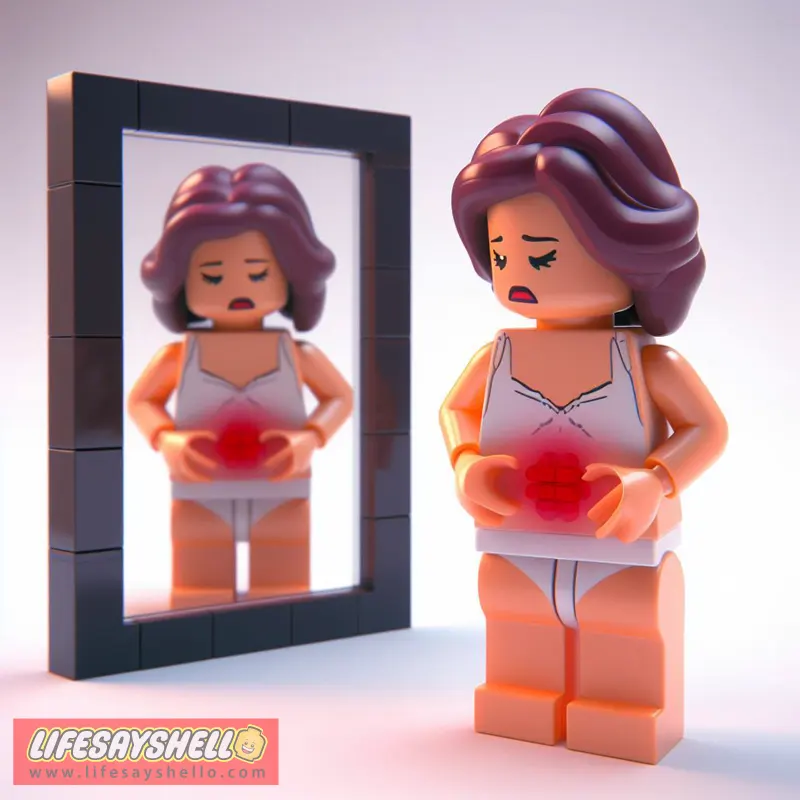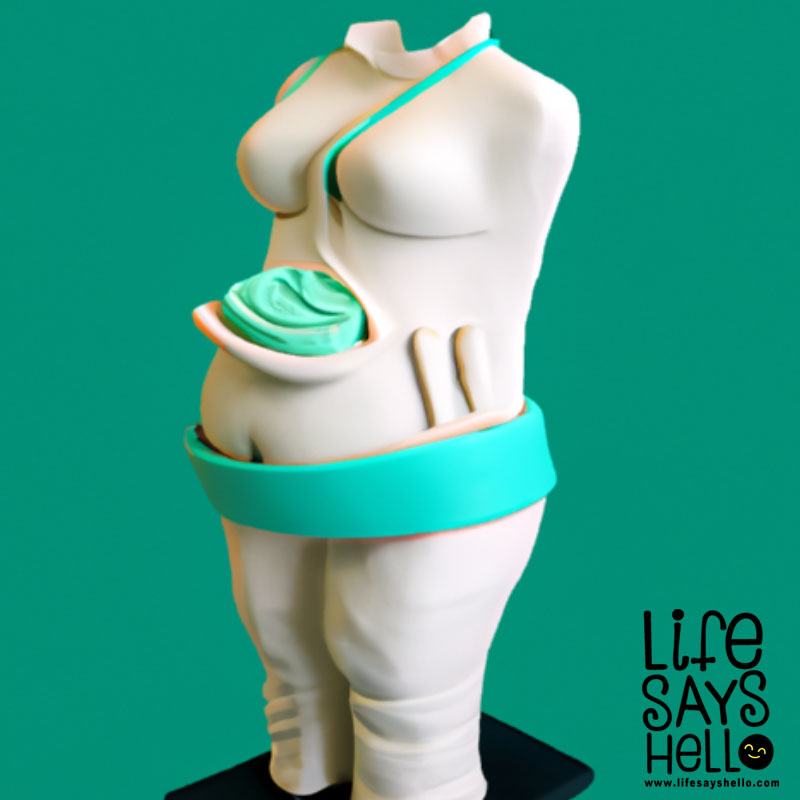Why Is My Stomach Always So Bloated? 9 Possible Causes and How to Get Relief

Do you feel like you always look a few months pregnant? Does your belly bloat up like a balloon after every meal? You’re not alone. Bloating is one of the most common digestive issues that people face on a regular basis.
But what exactly causes that uncomfortable tight, swollen feeling in your stomach? And what can you do to get rid of abdominal bloat once and for all?
This blog post will dive into the most likely reasons behind your persistent bloating, plus provide tips for how to reduce it naturally at home.
Excess Intestinal Gas is the Most Common Culprit
Excess gas production in your gastrointestinal (GI) tract is by far the number one cause of bloating for most people. We all swallow a bit of air when we eat or drink beverages. And things like chewing gum, sucking on hard candy, smoking, and drinking carbonated sodas or beer can cause us to swallow even more air, which then leads to gas and bloating.
Some people also just naturally produce more gas than others after eating certain foods. Beans, dairy products, cruciferous vegetables like cabbage and broccoli, and high fiber foods tend to be the biggest gas producers for many folks. The bacteria in your intestines breaks those foods down and releases hydrogen, methane, and carbon dioxide gas as a byproduct.
Plus, everyone’s intestinal tract hosts a different mix of gut bacteria. So the types and amounts of gas produced can vary quite a bit from one person to the next even when eating the exact same meal.
Tips for Reducing Excess Gas
- Avoid carbonated drinks, beer, chewing gum, and smoking
- Don’t use straws, which cause you to swallow more air
- Eat and drink slowly
- Don’t talk while eating
- Limit gas-producing foods like beans, dairy, cabbage, broccoli
- Try an over-the-counter gas relief product like Gas-X or Beano
- Take a probiotic supplement to support healthy gut bacteria
- Get more physical activity - exercise helps move gas through the intestines
Constipation Can Lead to Bloating and Discomfort
When stool moves very slowly through your digestive tract, it causes gas, belly distension, and bloating. The longer the transit time from when you first ingest food to when you poop it out, the more time there is for gas-producing fermentation by gut bacteria.
Constipation is sometimes caused by not getting enough fiber in your diet. Fiber helps add bulk to stool and draws in water, making bowel movements easier to pass. Not drinking enough fluids can also lead to hard, dry stools that are difficult to push out.
Certain medications like narcotic pain meds, antidepressants, iron, and calcium supplements are also frequent offenders when it comes to constipation and bloating. Some medical conditions like multiple sclerosis, colon cancer, and thyroid disorders can also slow down your digestive transit.
Women are especially prone to constipation and bloating during pregnancy due to hormonal changes and the pressure of the growing uterus on the intestines.
Tips for Relieving Constipation
- Eat more high fiber foods like fruits, veggies, beans, whole grains
- Stay well hydrated by drinking plenty of water
- Exercise regularly to stimulate the bowels
- Ask your doctor about using a stool softener or laxative if needed
- Treat any underlying medical issues causing constipation
Food Intolerances Can Lead to Bloating and Discomfort After Meals
If your body has difficulty properly digesting certain foods, it can cause post-meal bloating, gas, and other GI symptoms. The most common problem foods tend to be dairy, gluten, and other grains.
Lactose intolerance is caused by not having enough of the lactase enzyme needed to break down the lactose sugars in dairy products. Undigested lactose sits in the intestines, drawing in water via osmosis and getting fermented by bacteria into gas.
For people with celiac disease or non-celiac gluten sensitivity, eating gluten triggers immune system reactions and inflammation in the small intestine. This can interfere with proper nutrient absorption and cause abdominal discomfort, in addition to diarrhea, fatigue, and other symptoms.
Other potential food intolerances include corn, soy, eggs, nuts, nightshade vegetables like tomatoes, peppers, and eggplant. The only way to pinpoint your trigger foods is to try an elimination diet that removes suspect foods for 2-4 weeks, then reintroduces them one at a time while monitoring symptoms.
Tips for Dealing with Food Intolerances
- Try eliminating common problem foods like dairy, gluten, etc.
- Keep a food journal to track symptoms
- Get tested for celiac disease if you have gluten issues
- Take lactase enzyme pills when consuming dairy
- Substitute problem foods with tolerable alternatives
Hormonal Shifts Can Cause Bloating for Many Women
Bloating that seems to coincide with your menstrual cycle is usually related to hormonal fluctuations. In the days leading up to your period, levels of estrogen and progesterone shift, which can disrupt digestion and cause fluid retention.
Many women experience mild bloating, constipation, and stomach pain around the time of ovulation as well. Changes in hormone levels not only affect the digestive organs, but also impact the sympathetic nervous system.
Postmenopausal women who are no longer cycling may also occasionally get bloated from hormone medications like estrogen replacement therapy or birth control pills.
Pregnancy is another time when female hormone surges often lead to frequent bloating and gas issues. The elevated progesterone of pregnancy slows down digestion to aid nutrient absorption for the developing fetus.
Tips for Coping with Hormonal Bloating
- Avoid gassy foods and salt before your period
- Stay hydrated to reduce fluid retention
- Consider taking digestive enzymes or probiotics
- Ask your doctor about alternatives if your birth control pill causes bloating
- Wear loose, comfortable clothing during hormonal fluctuations
Certain Medical Conditions Can Cause Chronic Bloating
While most bloating is due to minor issues like diet, gas, or menstrual cycles, there are some medical conditions that can cause chronic, severe, or recurrent bloating episodes. Bring up ongoing problems with abdominal bloating with your doctor to rule out any underlying illness.
Gastrointestinal Disorders
- Irritable bowel syndrome - bloating, gas, constipation, diarrhea
- Acid reflux and GERD - indigestion, stomach acid backup
- Gastritis - stomach lining inflammation
- Peptic ulcers - open sores in stomach lining
- Diverticulitis - infection of small pouches in the intestines
- Gallstones - hard deposits blocking digestive fluids
- Small intestinal bacterial overgrowth (SIBO) - excessive bacteria in small intestine
- Celiac disease - immune reaction to gluten
Gynecological Conditions
- Ovarian cancer - abdominal swelling is a common symptom
- Uterine fibroids - noncancerous growths in uterus wall
- Endometriosis - uterine tissue growing outside the uterus
- Pelvic inflammatory disease - infection of female reproductive organs
Other Diseases
- Heart, liver, or kidney failure - fluid retention
- Abdominal hernias - internal tissue protruding through weak spots
- Ascites - fluid buildup in the abdominal cavity
- Carcinoid tumors - rare tumors that produce serotonin
Tips for Managing Medical Condition Bloating
- Follow treatment plans from your physician
- Take prescribed medications - antibiotics, anti-inflammatories, etc.
- Adopt any recommended dietary changes - low fiber, low lactose, etc.
- Try over-the-counter bloating aids if approved by your doctor
When Should You See a Doctor About Bloating?
Occasional mild bloating after a heavy meal or during PMS is usually normal. But in some cases, bloating can signal an underlying medical issue that needs professional diagnosis and care. Talk to your doctor if you experience:
- Bloating that persists daily for 3 weeks or longer
- Bloating accompanied by vomiting, weight loss, fever, or blood in stool
- Severe abdominal swelling and pain
- Bloating that interferes with work, sleep, or daily activities
- Very frequent bloating episodes - more than 12 times per month
Severe, chronic bloating should always be evaluated by a physician. Write down all your symptoms, make notes about any possible trigger foods, and outline your medical history to share with the doctor.
Some diagnostic tests your doctor might order include:
- Blood tests to look for signs of inflammation or malnutrition
- Stool sample tests for blood, bacteria, or parasites
- Abdominal CT scan or ultrasound to check for structural issues
- Endoscopy to view your upper digestive tract
- Colonoscopy to examine the large intestine
- Food allergy testing
9 Tips to Reduce Bloating Naturally at Home
While waiting to get into the doctor or in tandem with medical treatment, there are some simple at-home remedies you can try to get relief from a bloated belly:
1. Limit Salt Intake
Too much sodium causes your body to retain extra fluid, resulting in a puffy, swollen tummy. Avoid adding table salt to foods, and limit processed foods with high sodium.
2. Increase Physical Activity
Any type of exercise helps get things moving through your gastrointestinal tract. Aim for at least 30 minutes of moderate activity like walking or swimming on most days. Yoga poses and pilates can also aid digestion.
3. Drink More Water
Staying hydrated prevents constipation and helps flush out bloat-causing sodium. Drink at least eight 8-ounce glasses of water daily. Add lemon, mint, or cucumber for flavor.
4. Take Probiotics
These healthy gut bacteria support regularity and healthy digestion. Look for broad spectrum probiotic supplements, and consume probiotic foods like yogurt, kefir, kimchi, and kombucha.
5. Use Over-the-Counter Remedies
Products like Gas-X, Beano, and activated charcoal tablets can provide relief from gas and bloating. Ask your pharmacist for recommended options.
6. Manage Stress Levels
Chronic stress and anxiety interfere with digestion and can make bloating worse. Try relaxing activities like meditation, deep breathing, massage, and yoga.
7. Wear Loose Clothing
Tight pants, shapewear, and belts put added pressure on your abdomen. Opt for loose, comfortable clothing around your stomach and waist.
8. Limit Chewing Gum
Chewing gum causes you to swallow excess air. Cut back or avoid gum altogether if it makes you gassy and bloated.
9. Keep a Food Journal
Track everything you eat and drink along with GI symptoms. Look for patterns between specific foods and your level of bloating.
Find Long-Term Relief from Bloating
Bloating can be uncomfortable and frustrating to deal with on a regular basis. Pay attention to your symptoms, take note of any dietary triggers, and don’t hesitate to consult your physician if your bloating persists or worsens.
With the right combination of lifestyle changes, over-the-counter remedies, and possible medical treatment, you should be able to minimize annoying bloating episodes and keep your GI system happy. Stick with the tips above to reduce bloating naturally and get your flat belly back!
Let me know if you would like me to modify or expand this article draft in any way. I’m happy to keep refining the content until it meets your needs. Please provide any feedback on the title, structure, tone, or topics covered.




Comments